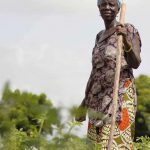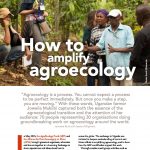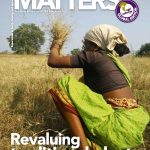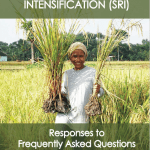17 downloads
Title of document: Stories From The Field - Women working toward a non-toxic environment Author: Ilang Ilang Quijano et al. on behalf of Towards a Non-toxic Southeast Asia Date of publication: 2016 Geographical focus: Cambodge, China, Laos, Thailand, Vietnam Summary: The often unseen but disastrous consequences of chemical-intensive food and agricultural production are felt most by half of the world’s food producers and rural population: women. On the average, women make up about 43 percent of the agricultural labour force in developing countries, according to the Food and Agriculture Organization (FAO). Women are involved in all stages of food production—everything from seed collection, land preparation, fertilizer and pesticides application, weeding, harvesting and storage, food processing, and livestock rearing. In addition, they are also responsible for most household and child-rearing activities. This booklet contains a collection of stories of 25 women from five countries who are involved in an inspiring, ongoing campaign to eliminate use of chemical pesticides and promote agroecology in the Mekong Region. These women are part of the programme Towards a Non-toxic SouthEast Asia, a programme aiming to reduce health and environmental risks from chemicals by monitoring, regulating and managing agricultural, industrial and consumer chemicals. Partners in this initiative are the Swedish Chemicals Agency (KemI), Food and Agriculture Organization of the United Nations (FAO), Pesticide Action Network Asia and the Pacific (PAN AP) and The Field Alliance (TFA). The stories in this booklet highlight how women were influenced by the work of these dedicated organizations and how various activities and support resulted in mobilization of communities to start working for improved livelihoods, through reduction of pesticides use and shift to agro-ecology. Read More
20 downloads
Title of document: Assessing capacity needs of extension and advisory services. A Guide for Facilitators Authors : Nimisha Mittal, Rasheed Sulaiman V and R M Prasad, on behalf of the Agricultural Extension in South Asia (AESA) Date of publication: July 2016 Geographical focus: India, Sri Lanka, Bangladesh, and Nepal Summary: This guide is intended to assist facilitators in conducting a workshop with Extension and Advisory Service (EAS) providers for assessing their capacity needs. This guide has been compiled by the Centre for Research on Innovation and Science Policy (CRISP) for AESA with the assistance of a research grant from the Global Forum for Rural Advisory Services (GFRAS). The purpose of the research grant was to identify capacity gaps at various levels (individual, organizational, and enabling environment levels) among EAS providers in four South Asian countries and develop a facilitator guide for Capacity Needs Assessment (CNA) based on this methodology. This guide builds on the outputs of the four National Workshops on “Capacity Needs Assessment of Extension and Advisory Service (EAS) Providers” held in India, Sri Lanka, Bangladesh, and Nepal during 2015-2016. This guide can be used as a standalone document / procedure for assessing the capacity needs of the extension and advisory service providers. However, using this guide for CNA has greater value if the outputs of this exercise are linked to a capacity development process. Moreover, this process also needs to be organised periodically to identify new capacity gaps. Read More
4 downloads
Title of document: Voluntary Guide for National Seed Policy Formulation Author: Food and Agriculture Organization of the United Nations (FAO) Date of publication: 2015 Geographical focus: Worldwide Summary: Ensuring that farmers have access to affordable quality seeds and planting materials of the most suitable crop varieties is essential for improving food security and nutrition as well as the livelihoods of farming communities. In many developing countries, there is a lack of adequate seed policies – i.e. principles that guide government action and define the roles of stakeholders. The absence of such policies weakens countries’ capacity to provide smallholders with adequate access to quality seeds of the crops most suited to their farming systems, conditions and needs. This Guide has been developed to assist governments in formulating policies which help create an enabling environment for seed sector development. Read More

11 downloads
Title of document: L'agroécologie: reconnecter l'homme à son écosystème Author: Michel Sonet et Eric Capoen, Aide au Développement Gembloux (ADG) Year of publication: Novembre 2016 Geographic focus: International Summary: Pour célébrer ses trente ans d’action au service des familles paysannes et de la souveraineté alimentaire, Aide au Développement Gembloux se dote d’une publication à destination de toute personne qui souhaite en savoir plus sur l’agroécologie : son évolution, sa définition, ses freins et limites et les solutions qu’elle porte en elle, en illustrant nos propos d’exemples concrets au Nord et au Sud. « Face à un système qui confisque le droit des peuples à se nourrir par eux-mêmes, l’agroécologie est une alternative éthique et réaliste, un acte de légitime résistance, qui permet l’autonomie des populations et la préservation de leurs patrimoines nourriciers ». Pierre Rabhi Read More

9 downloads
Title of document: How to amplify agroecology ? Author: Agroecology Learning Exchange Year of publication: May 2016 Geographic focus: Uganda, Worldwide Summary: Amplification of agroecological experiences is “the main challenge today”, in the words of former UN Special Rapporteur on the Right to Food, Olivier De Schutter, because of its many contributions to addressing challenges such as hunger, poverty, loss of biodiversity and climate change. The participants in the Learning Exchange see amplification of agroecology as the transformation of food systems, rather than just the spreading of a set of food production techniques. Importantly, it promotes alternative forms of economic exchange and places agrobiodiversity, the struggle for land, control over seed and local farming and marketing knowledge (especially that of women) at the centre of this change processes. Amplification of agroecology was seen as a long-term process that is led by social movements, but encompasses all actors in the food system, including consumers. As agroecology is understood as an ongoing process of transition, there is no pre-determined end goal in its amplification, save for the broad objective of transforming food systems around the world. Read More

8 downloads
Title of document: Farming Matters - Revaluing traditional plants Support: Magazine Issue: N° 32.2 Publisher: Farming Matters is published by ILEIA, the centre for learning on sustainable agriculture. ILEIA is a member of the AgriCultures Network, a global network of organisations that shares knowledge on agroecology and family farming. www.farmingmatters.org Date of publication: June 2016 Geographic focus: World wide Summary: This issue of Farming Matters looks at the growing number of initiatives worldwide that aim to harness the potential of traditional plants. Cultivating traditional plants builds resilience and nutrition, strengthens cultural practices and enhances food sovereignty. From the experiences presented here we learn that for the successful revival of traditional plants, farmers’ knowledge on agricultural biodiversity, nutrition and culture must also be valued and protected. And this works best through a holistic approach – from field to fork to politics. Read More
9 downloads
Title of document: Minutes of “Lao Bamboo & Rattan Platform” workshop, 15th and 16th June 2016 Vientiane, Lao PDR Author: Sara Melki Ministry/Government Agency/Organisation: GRET Year of publication: 2016 Geographic focus: Laos Summary: A Lao Bamboo & Rattan Platform workshop addressing the development of the bamboo and rattan sector in Lao PDR was held on the 15th and 16th of June 2016 in Vientiane capital, Lao PDR. It was co- organised by DoF/ MAF, GRET, WWF and RECOFTC. It brought together 38 participants from national and international NGOs, researchers and provincial and national governments agencies, development partners actively working on developing the bamboo and rattan sector in Lao PDR (see participants list in Annex). It aimed at defining and creating a dynamic Lao Bamboo & Rattan Platform for facilitating experience sharing among projects in the country in order to create a common vision, to act the willingness of a Lao Bamboo & Rattan Platform as well as to start the formulation of an action-plan of the Lao Bamboo & Rattan Platform for initiating a discussion on the national governance of the bamboo & Rattan value chains in Laos. The workshop was organized into 2 sessions: - - Presentation of the national forestry strategy, related to NTFP and bamboo and a review of main 6 bamboo and rattan projects implemented in Laos (short presentations) - - 2 discussions : --> Can we scale up the Houaphan experience to National sector development? What are our common vision and objectives on developing the bamboo sector in Lao PDR? Construction of a Lao bamboo sector governance, based on Huaphan Province experience --> What are main Functions and activities for the Lao Bamboo & Rattan Platform for the next 3 years? Read More

34 downloads
Title of document: The System of Rice Intensification (SRI): Responses to frequent asked questions Authors: Norman Uphoff Ministry/Government Agency/Organisation: Cornell University Year of publication: 2015 Geographic focus: World wide Url original document: http://sri.cals.cornell.edu/news/features/2016/featured040416.html Summary: Compared to a decade ago, many more persons – at least 10 million people, most of them farmers -- can now answer the question "What is SRI?" at least in general terms. However, most would probably not give very detailed answers, and many would like to know more about this strategy for raising the crop yield of rice, and now also other grains, legumes and vegetables, just by changing the way that these crops are managed, with minimal reliance on purchased inputs. Also by now, many more persons will at least have heard something about SRI and about its benefits for producers, for consumers, and for the environment. They may well be interested in a systematic introduction to this phenomenon which has demonstrated positive results in more than 50 countries around the world (http://sri.cals.cornell.edu/countries/index.html). So this book is written for both groups of potential readers, bringing together in one place much of the accumulated field experience and scientific research that makes the System of Rice Intensification and its derivations grouped under the broad heading of the System of Crop Intensification an unprecedented opportunity for enabling people to improve their lives in this 21st century. Read More
11 downloads
Title of document: Agroecology and the Food System Authors: A. Wezel and C. David Ministry/Government Agency/Organisation: Department of Agroecosystems, Environment and Production, ISARA Lyon (associated member of the University of Lyon), 23 rue Jean Baldassini, 69364 Lyon cedex 07, France Year of publication: 2012 Geographic focus: World wide Url original document: https://www.researchgate.net/publication/226169779_Agroecology_and_the_Food_System Summary: On a global scale agriculture and food will face key challenges of properly feeding a population of nine billion individuals in 2050, while preserving the ecosystems from which other services are also expected, such as bioenergy production, biodiversity use and conservation, carbon storage and climate regulation. To develop future sustainable agricultural production and food systems, agronomic, ecological, economic and social challenges have to simultaneously be taken into account. The framework of agroecology applied on the food system could be a useful concept to support this development. Although the scale and dimension of scientific research in agroecology has been enlarged in the last years towards the food system approach, it is still difficult to outline clear concepts, new models and new methods that specify it. Read More
6 downloads
Title of document: Are Local food Chains More Sustainable than Global Food Chains? Considerations for Assessment Authors: Gianluca Brunori, Francesca Galli, Dominique Barjolle, Rudolf van Broekhuizen, Luca Colombo, Mario Giampietro, James Kirwan, Tim Lang, Erik Mathijs, Damian Maye, Kees de Roest, Carin Rougoor, Jana Schwarz, Emilia Schmitt, Julie Smith, Zaklina Stojanovic , Talis Tisenkopfs and Jean-Marc Touzard Ministry/Government Agency/Organisation: Year of publication: 2016 Geographic focus: World wide Url original document: http://www.mdpi.com/2071-1050/8/5/449 Summary: This paper summarizes the main findings of the GLAMUR project which starts with an apparently simple question: is “local” more sustainable than “global”? Sustainability assessment is framed within a post-normal science perspective, advocating the integration of public deliberation and scientific research. The assessment spans 39 local, intermediate and global supply chain case studies across different commodities and countries. Assessment criteria cover environmental, economic, social, health and ethical sustainability dimensions. A closer view of the food system demonstrates a highly dynamic local–global continuum where actors, while adapting to a changing environment, establish multiple relations and animate several chain configurations. Read More

 Asia & Mekong Region
Asia & Mekong Region  Cambodia
Cambodia  Laos
Laos  Myanmar
Myanmar  Other
Other  Vietnam
Vietnam